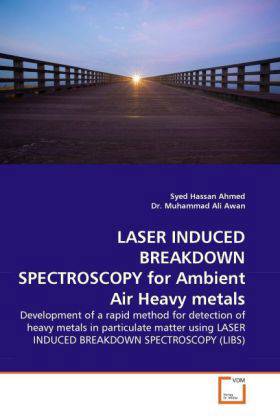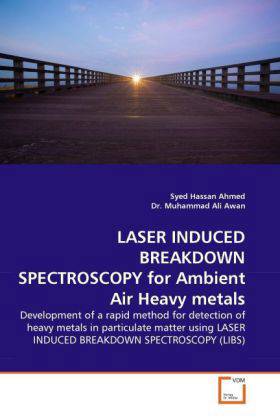
- Afhalen na 1 uur in een winkel met voorraad
- Gratis thuislevering in België vanaf € 30
- Ruim aanbod met 7 miljoen producten
- Afhalen na 1 uur in een winkel met voorraad
- Gratis thuislevering in België vanaf € 30
- Ruim aanbod met 7 miljoen producten
Zoeken
LASER INDUCED BREAKDOWN SPECTROSCOPY for Ambient Air Heavy metals
Development of a rapid method for detection of heavy metals in particulate matter using LASER INDUCED BREAKDOWN SPECTROSCOPY (LIBS)
Syed Hassan Ahmed, Muhammad Ali Awan
Paperback | Engels
€ 64,45
+ 128 punten
Omschrijving
Laser induced breakdown spectroscopy (LIBS) is a latest advancement in the field of analytical techniques. it can perform real time analysis with detection up to ppm levels. For detection of heavy metals in ambient air in particulate matters different techniques are used widely used technique is atomic absorption spectroscopy which is sequential, time consuming and expensive. For these reasons LIBS was used. A rapid method was developed in which LIBS was optimized to detect cadmium, zinc and lead on filter paper. Calibration curves were prepared for quantitative analysis. Then real samples from 4 different locations were collected on filter paper and were analyzed using the developed method on LIBS. To validate the results obtained by developed method on LIBS the results were compared to X-Ray Florescence technique for qualitative and on Atomic Absorption spectroscopy for quantitative analysis. The results were comparable and of same magnitude.
Specificaties
Betrokkenen
- Auteur(s):
- Uitgeverij:
Inhoud
- Aantal bladzijden:
- 84
- Taal:
- Engels
Eigenschappen
- Productcode (EAN):
- 9783639312379
- Verschijningsdatum:
- 25/11/2010
- Uitvoering:
- Paperback
- Afmetingen:
- 152 mm x 229 mm
- Gewicht:
- 136 g

Alleen bij Standaard Boekhandel
+ 128 punten op je klantenkaart van Standaard Boekhandel
Beoordelingen
We publiceren alleen reviews die voldoen aan de voorwaarden voor reviews. Bekijk onze voorwaarden voor reviews.







